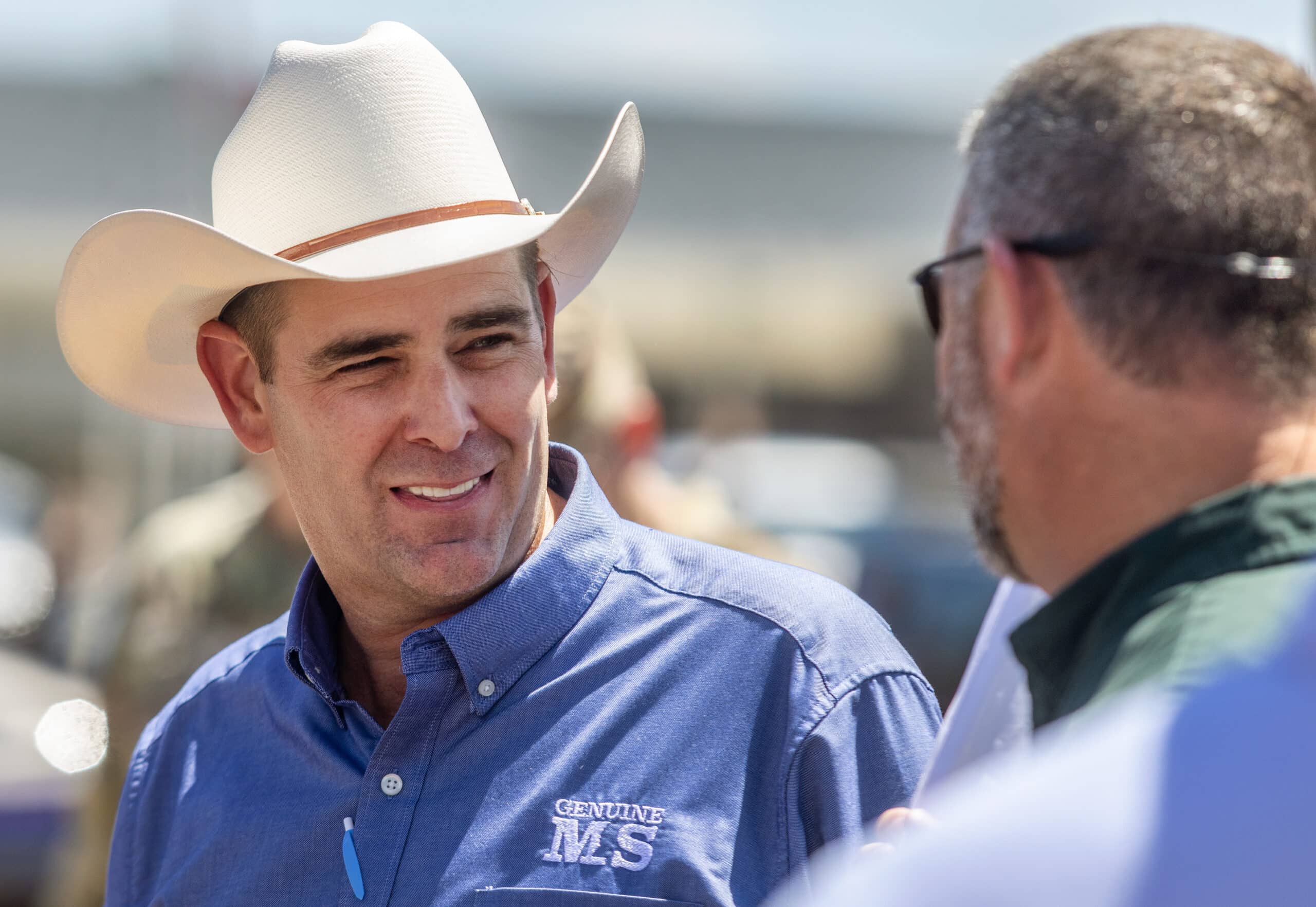Mississippi Today
‘Hot, hot, hot’: Historic heat and drought taking toll on state’s agriculture

No state in the contiguous United States has had more rainfall than Mississippi over the last five years. But even the wettest parts of the country are seeing their crops dry up due to unrelenting drought this summer.
A variety of plants, from cotton to soybeans to peanuts, are taking a hit in Mississippi. Livestock farmers, faced with dried up pastures, are either having to sell their cattle or feed them hay that’s supposed to be saved for the winter.
“Normally, we don’t start feeding hay to cattle until November usually,” said Shelby Bearden, Mississippi State University’s Extension agent for Copiah County. “And there were people feeding hay in August this year.”
Experienced farmers, like Louis Guedon in Jefferson County, said it’s been decades since Mississippi has seen conditions like this year.
“It ain’t been this dry in thirty-something years,” said Guedon, adding that he’s grown just a fifth of the number of corn bushels he gets under average weather conditions. “It’s a bloodbath.”
About a third of the state is experiencing “severe to exceptional” drought, according to the state’s agriculture department, and over two-thirds are seeing at least minimal drought. Over the last month, the U.S. Department of Agriculture has declared emergencies for 24 counties in Mississippi to help farmers in those areas access federal assistance.
While most of Mississippi is seeing at least “abnormally dry” weather, according to the U.S. Drought Monitor, the worst conditions are concentrated in the southern half of the state, especially in Amite, Pike, Walthall, Lawrence, Lincoln, Copiah and Simpson counties.
“It’s the worst drought we’ve seen in a long, long time,” said Mississippi Commissioner of Agriculture and Commerce Andy Gipson in a Sept. 8 news release. Gipson later told Mississippi Today that it’s too early to know where this year’s drought ranks versus previous ones, but that it’s so far comparable to one the state had in the late 1980s.

Hazelhurst farmer Walter West Jr. said the dry conditions have lasted since mid-July. At his family’s farm, he said they were able to plant corn early enough to get a good yield, but have lost about $100,000 from reduced cotton output. A third-generation farmer, West said the variance in weather conditions is just part of the job.
“That’s the risk you take,” he said, adding that some years the crops suffer from too much rain. “It’s just a big gamble I guess. Mother Nature, she’s the ultimate determination of what you do, and you’re at her mercy year in and year out.”
West said he could potentially tap into his crop insurance to stabilize the farm’s finances for next year, but hopes to not have to go that route. Gipson encouraged farmers to contact their local USDA office to report their losses and to see what types of federal aid they can access.
Guedon, whose farm has been in his family for over 150 years, emphasized that the issue is the combination of the lack of rain with the intense heat.
This summer, Jackson saw its hottest August ever, with an average temperature of 87.8 degrees Fahrenheit, according to the National Weather Service. This July was the third-hottest ever in the city.
“If you don’t think that doing nothing in 100 degree heat will exhaust you, just go put your chair out in the middle of the parking lot and just sit in it for eight hours,” Guedon said. “Your clothes will be wet with sweat, you’ll be able to wring water out of your underwear.”
He said in addition to drying out crops, the high temperatures affect his cows’ reproductive cycles.
“They’re less likely to ovulate when it’s hot, hot, hot,” he said. “And the bulls… they don’t breed the cattle as well when it’s hot, hot, hot.”

Credit: Eric Shelton/Mississippi Today
Gipson said livestock farmers are having to make tough decisions to survive financially.
“It truly is a disaster, that’s the only word for it,” the commissioner said. “A lot of the (livestock producers) are being forced into a position of having to sell out because they can’t afford to hold these cows through these conditions.”
As of Sept. 14, Mississippi farmers in 32 counties were eligible for the USDA’s Livestock Forage Disaster Program, which provides compensation to livestock producers who suffer grazing losses due to drought.
Gipson said the tough year for Mississippi farmers goes back to March, when a winter freeze took out much of the state’s blueberry production.
Despite the trying conditions, he hopes those who can will try again next year.
“I encourage every one of our farmers to get back in as soon as possible because we really need every farmer in this state,” Gipson said. “We already have fewer farmers than we’ve ever had.”
This article first appeared on Mississippi Today and is republished here under a Creative Commons license.
Mississippi Today
1964: Mississippi Freedom Democratic Party was formed
April 26, 1964

Civil rights activists started the Mississippi Freedom Democratic Party to challenge the state’s all-white regular delegation to the Democratic National Convention.
The regulars had already adopted this resolution: “We oppose, condemn and deplore the Civil Rights Act of 1964 … We believe in separation of the races in all phases of our society. It is our belief that the separation of the races is necessary for the peace and tranquility of all the people of Mississippi, and the continuing good relationship which has existed over the years.”
In reality, Black Mississippians had been victims of intimidation, harassment and violence for daring to try and vote as well as laws passed to disenfranchise them. As a result, by 1964, only 6% of Black Mississippians were permitted to vote. A year earlier, activists had run a mock election in which thousands of Black Mississippians showed they would vote if given an opportunity.
In August 1964, the Freedom Party decided to challenge the all-white delegation, saying they had been illegally elected in a segregated process and had no intention of supporting President Lyndon B. Johnson in the November election.
The prediction proved true, with white Mississippi Democrats overwhelmingly supporting Republican candidate Barry Goldwater, who opposed the Civil Rights Act. While the activists fell short of replacing the regulars, their courageous stand led to changes in both parties.
This article first appeared on Mississippi Today and is republished here under a Creative Commons Attribution-NoDerivatives 4.0 International License.![]()
Mississippi Today
Mississippi River flooding Vicksburg, expected to crest on Monday
Warren County Emergency Management Director John Elfer said Friday floodwaters from the Mississippi River, which have reached homes in and around Vicksburg, will likely persist until early May. Elfer estimated there areabout 15 to 20 roads underwater in the area.
“We’re about half a foot (on the river gauge) from a major flood,” he said. “But we don’t think it’s going to be like in 2011, so we can kind of manage this.”
The National Weather projects the river to crest at 49.5 feet on Monday, making it the highest peak at the Vicksburg gauge since 2020. Elfer said some residents in north Vicksburg — including at the Ford Subdivision as well as near Chickasaw Road and Hutson Street — are having to take boats to get home, adding that those who live on the unprotected side of the levee are generally prepared for flooding.



“There are a few (inundated homes), but we’ve mitigated a lot of them,” he said. “Some of the structures have been torn down or raised. There are a few people that still live on the wet side of the levee, but they kind of know what to expect. So we’re not too concerned with that.”
The river first reached flood stage in the city — 43 feet — on April 14. State officials closed Highway 465, which connects the Eagle Lake community just north of Vicksburg to Highway 61, last Friday.

Elfer said the areas impacted are mostly residential and he didn’t believe any businesses have been affected, emphasizing that downtown Vicksburg is still safe for visitors. He said Warren County has worked with the U.S. Army Corps of Engineers and the Mississippi Emergency Management Agency to secure pumps and barriers.
“Everybody thus far has been very cooperative,” he said. “We continue to tell people stay out of the flood areas, don’t drive around barricades and don’t drive around road close signs. Not only is it illegal, it’s dangerous.”
NWS projects the river to stay at flood stage in Vicksburg until May 6. The river reached its record crest of 57.1 feet in 2011.




This article first appeared on Mississippi Today and is republished here under a Creative Commons Attribution-NoDerivatives 4.0 International License.![]()
Mississippi Today
With domestic violence law, victims ‘will be a number with a purpose,’ mother says
Joslin Napier. Carlos Collins. Bailey Mae Reed.
They are among Mississippi domestic violence homicide victims whose family members carried their photos as the governor signed a bill that will establish a board to study such deaths and how to prevent them.
Tara Gandy, who lost her daughter Napier in Waynesboro in 2022, said it’s a moment she plans to tell her 5-year-old grandson about when he is old enough. Napier’s presence, in spirit, at the bill signing can be another way for her grandson to feel proud of his mother.
“(The board) will allow for my daughter and those who have already lost their lives to domestic violence … to no longer be just a number,” Gandy said. “They will be a number with a purpose.”
Family members at the April 15 private bill signing included Ashla Hudson, whose son Collins, died last year in Jackson. Grandparents Mary and Charles Reed and brother Colby Kernell attended the event in honor of Bailey Mae Reed, who died in Oxford in 2023.
Joining them were staff and board members from the Mississippi Coalition Against Domestic Violence, the statewide group that supports shelters and advocated for the passage of Senate Bill 2886 to form a Domestic Violence Facility Review Board.
The law will go into effect July 1, and the coalition hopes to partner with elected officials who will make recommendations for members to serve on the board. The coalition wants to see appointees who have frontline experience with domestic violence survivors, said Luis Montgomery, public policy specialist for the coalition.
A spokesperson from Gov. Tate Reeves’ office did not respond to a request for comment Friday.
Establishment of the board would make Mississippi the 45th state to review domestic violence fatalities.
Montgomery has worked on passing a review board bill since December 2023. After an unsuccessful effort in 2024, the coalition worked to build support and educate people about the need for such a board.
In the recent legislative session, there were House and Senate versions of the bill that unanimously passed their respective chambers. Authors of the bills are from both political parties.
The review board is tasked with reviewing a variety of documents to learn about the lead up and circumstances in which people died in domestic violence-related fatalities, near fatalities and suicides – records that can include police records, court documents, medical records and more.
From each review, trends will emerge and that information can be used for the board to make recommendations to lawmakers about how to prevent domestic violence deaths.
“This is coming at a really great time because we can really get proactive,” Montgomery said.
Without a board and data collection, advocates say it is difficult to know how many people have died or been injured in domestic-violence related incidents.
A Mississippi Today analysis found at least 300 people, including victims, abusers and collateral victims, died from domestic violence between 2020 and 2024. That analysis came from reviewing local news stories, the Gun Violence Archive, the National Gun Violence Memorial, law enforcement reports and court documents.
Some recent cases the board could review are the deaths of Collins, Napier and Reed.
In court records, prosecutors wrote that Napier, 24, faced increased violence after ending a relationship with Chance Fabian Jones. She took action, including purchasing a firearm and filing for a protective order against Jones.
Jones’s trial is set for May 12 in Wayne County. His indictment for capital murder came on the first anniversary of her death, according to court records.
Collins, 25, worked as a nurse and was from Yazoo City. His ex-boyfriend Marcus Johnson has been indicted for capital murder and shooting into Collins’ apartment. Family members say Collins had filed several restraining orders against Johnson.
Johnson was denied bond and remains in jail. His trial is scheduled for July 28 in Hinds County.
He was a Jackson police officer for eight months in 2013. Johnson was separated from the department pending disciplinary action leading up to immediate termination, but he resigned before he was fired, Jackson police confirmed to local media.
Reed, 21, was born and raised in Michigan and moved to Water Valley to live with her grandparents and help care for her cousin, according to her obituary.
Kylan Jacques Phillips was charged with first degree murder for beating Reed, according to court records. In February, the court ordered him to undergo a mental evaluation to determine if he is competent to stand trial, according to court documents.
At the bill signing, Gandy said it was bittersweet and an honor to meet the families of other domestic violence homicide victims.
“We were there knowing we are not alone, we can travel this road together and hopefully find ways to prevent and bring more awareness about domestic violence,” she said.
This article first appeared on Mississippi Today and is republished here under a Creative Commons Attribution-NoDerivatives 4.0 International License.
-

 News from the South - Florida News Feed6 days ago
News from the South - Florida News Feed6 days agoJim talks with Rep. Robert Andrade about his investigation into the Hope Florida Foundation
-

 News from the South - Alabama News Feed5 days ago
News from the South - Alabama News Feed5 days agoPrayer Vigil Held for Ronald Dumas Jr., Family Continues to Pray for His Return | April 21, 2025 | N
-

 Mississippi Today5 days ago
Mississippi Today5 days ago‘Trainwreck on the horizon’: The costly pains of Mississippi’s small water and sewer systems
-

 News from the South - Texas News Feed5 days ago
News from the South - Texas News Feed5 days agoMeteorologist Chita Craft is tracking a Severe Thunderstorm Warning that's in effect now
-

 News from the South - Florida News Feed4 days ago
News from the South - Florida News Feed4 days agoTrump touts manufacturing while undercutting state efforts to help factories
-

 News from the South - Virginia News Feed5 days ago
News from the South - Virginia News Feed5 days agoTaking video of military bases using drones could be outlawed | Virginia
-

 News from the South - Texas News Feed7 days ago
News from the South - Texas News Feed7 days agoNo. 3 Texas walks off No. 9 LSU again to capture crucial SEC softball series
-

 News from the South - Florida News Feed4 days ago
News from the South - Florida News Feed4 days agoFederal report due on Lumbee Tribe of North Carolina’s path to recognition as a tribal nation














































